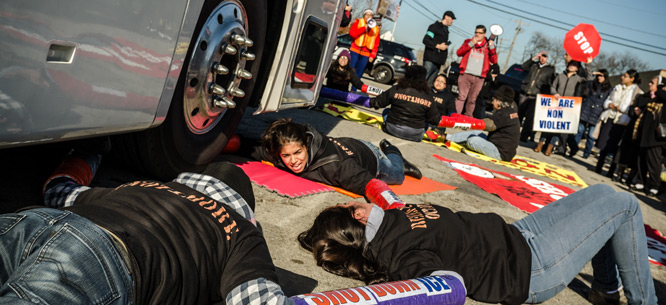Millennial Movements: Occupy Wall Street and the Dreamers
Millennial Movements: Occupy Wall Street and the Dreamers

The dominant narrative about the “Millennial” generation (roughly, those born between 1980 and 2000) portrays its members as selfish, lazy, narcissistic, entitled, and politically disengaged. Yet in 2008 Barack Obama captured their imaginations: 66 percent of voters under thirty cast their ballots for him, compared to half of those over that age—a larger disparity than in any presidential election since exit polling began in 1972.
Millennials not only voted for Obama, but volunteered—by the hundreds of thousands—to work on his campaign. Moreover, a wealth of survey data suggests that they lean to the left: Millennials are the only generation in which self-identified liberals currently outnumber self-identified conservatives, and they are far more likely than their elders to support same-sex marriage, labor unions, immigrant rights, and even socialism. College-educated Millennials are even more progressive than the generation as a whole.
The 2008 Wall Street crash and the Great Recession disproportionately affected Millennials, many of whom entered the labor market just when the crisis hit. They have been struggling ever since with unemployment, underemployment, debt, and other forms of economic precarity. These developments also helped spark a wave of political activism. In 2011 Millennials—especially the college-educated among them—made up the core of Occupy Wall Street and its various offshoots.
Another Millennial social movement emerged a decade earlier: the “Dreamers,” or undocumented immigrant youth campaigning for a path to legal status. The Dreamers are youthful by definition, and most have at least some college education. As undocumented immigrants, they can legally attend school, but until 2012 none were permitted to work either before or after they graduated. This movement is comprised mostly of those eligible for a legal path to citizenship under the proposed DREAM (Development, Relief, and Education for Alien Minors) Act, which would cover those brought to the United States as children who have completed at least two years of college or military service.
Occupiers and Dreamers alike are sharply critical of the political establishment, Obama included, and of the explosive growth in inequality since the 1970s. Both movements use the tactics of civil disobedience and direct action, including occupations of public spaces. Both support racial and gender equality and LGBT rights. Both movements also rely heavily on social media, as Millennials famously do in every aspect of their lives.
But despite their many similarities, Occupiers and Dreamers also differ in some key respects. One is demographic: white males were overrepresented among Occupy activists. Although many women and people of color were involved, they were less numerous and less visible. By contrast, the Dreamers are disproportionately led by...
Subscribe now to read the full article
Online OnlyFor just $19.95 a year, get access to new issues and decades' worth of archives on our site.
|
Print + OnlineFor $35 a year, get new issues delivered to your door and access to our full online archives.
|




